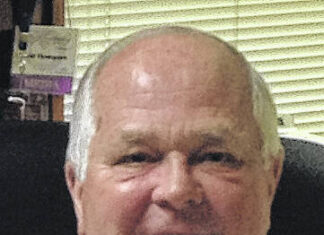Interim Maysville-Mason County Area Chamber of Commerce Director Bob Hendrickson likened Thursday’s chamber membership meeting as a “State of the Union Address” for the city and county.
The chamber hosted the annual community update from Maysville Mayor Charles Cotterill and Mason County Judge-Executive Joe Pfeffer at the Maysville Rotary Clubhouse. Social distancing protocols were in place.
Hendrickson opened the event by welcoming new chamber Director Kaci Compton. Acknowledging that former director Vicki Steigleder is a hard act to follow, he said he believes the committee charged with selecting a new director picked the right person to move the chamber forward.
Compton said she and her family recently relocated to Maysville and “I am thrilled to be here.” She said the experience has been wonderful so far and she has enjoyed what she called “Southern hospitality at its finest.”
Cotterill was first to take to the podium to present an overview of how the city has operated over the past year. Both he and Pfeffer said the COVID-19 pandemic has had a huge impact on how government operates.
He thanked the community for its response to the coronavirus.
“I thank everybody for the job they’ve done in handling the COVID virus,” he said. As mayor, he said he has gotten some complaints about mass gatherings and other breaches of protocol but they have been few.
He said the city was well prepared and was proactive in preparing for a worst-case scenario. Both the mayor and the judge-executive credited EmergencyManagement Director Clay Buser for the county’s response. Even state officials were calling on Buser for advice, Pfeffer said.
“We decided we weren’t going to wait until something happened,” Cotterill said. “We were told to prepare for lots of deaths. Fortunately that didn’t happen.”
“COVID-19 is still the elephant in the room; we don’t know what’s going to happen six months from now,” he said.
Beyond that, Cotterill gave an update on projects the city has completed, that are in the process and others planned. They include:
— Production of new floodwall pumps was stopped when the manufacturer closed for six months because of COVID-19, Cotterill said. The city now hopes the project can be completed by March 2021.
— The city currently has 141 full-time and 40 part-time employees, according to Cotterill. None of those employees were given a raise in the 2020-2021 budget because of uncertainty connected with the pandemic, he said.
— Funding for police body-worn cameras had been discussed at length but never approved in previous budgets, Cotterill said. That funding was approved this year before the current unrest began, he said.
— The city did provide for some much-needed equipment in its budget, such as a track hoe for Public Works which the mayor called the “heart and soul” of the city for the many jobs it performs from cutting weeds to small construction projects.
“You can’t work unless you have the tools to work with,” he said.
— The cleanup and sale of 30 dilapidated properties which netted the city $25,000 in revenue.
— Quarterly clean-ups which resulted in 50,000-60,000 pounds of trash and refuse being deposited in dumpsters during each quarter and removed from the city.
— The combination of some jobs to reduce payroll costs.
“Just because that’s the way things have always been done doesn’t mean it’s the right way,” Cotterill said.
— The Third Street project expected to start early next year during which Columbia Gas will replace cast iron pipes with the city following to replace aging water lines. The project will run from Wall Street to Bridge Street. Cotterill said it is unlikely the street will be closed since Third Street is also a state highway but told residents to be prepared to be inconvenienced.
“It’s going to be painful,” he said.
— The Wall Street combined sewer project. The city has been under a consent judgment to separate waste water and storm sewage runoff since 2008. Maysville has been given an extension by the EEC to eliminate the outfalls by 2023. The city has received $850,000 in grants and low costs loans for the latest leg of the project. Former Mayor David Cartmell said the city has already spent $13 million on early phases of the project
— The Corps of Engineer project to stabilize and upgrade the earthen portion of the floodwall. Cotterill said it is worth a walk for residents to get out and see what has been accomplished on the project.
Cotterill closed by pointing out the importance of private investment in the community. He said the loss of some retail business because of the pandemic is not a reflection on Maysville or its economic health as 94 percent of the city’s retail space is occupied.
“I say the future of Maysville looks bright,” he said.
Taking the podium, Pfeffer said it was good to meet with those on hand ‘“face-to-face,” for a change as the COVID-19 virus has made public meetings rare.
Pfeffer said the ability of the county and the city to work so well together has garnered not just local but also statewide attention. In edition to Buser, Pfeffer said kudos should be sent to Maysville-Mason County Economic and Industrial Development Authority Director Owen McNeill who has not slowed down in his efforts to market and bring attention to the area.
Pfeffer said the county “needs to continue and be prepared when the gate open,” and McNeill has kept his focus on those future opportunities.
“Logistically were in a good spot,” Pfeffer said.
While many businesses were forced to close when the state declared an emergency, Pfeffer said there services such as garbage collection, landfill operation and the detention center which the county could not shut down.
Pfeffer said one of his first concerns when dealing with the coronavirus was the detention center which he likened to “a cruise ship on dry land,” in the danger it presented for exposure and spread of the virus. To prevent anyone carrying the virus into the jail, Pfeffer said he worked with County Attorney John Estill and Commonwealth’s Attorney Kelly Clarke to reduce the population of the facility.
He also called a halt to the work release program for inmates which resulted in closure of the county’s recycling program. Instead, the recycling center was converted to a drive-through self-sort facility. While there was an initiate steep decline in the amount of recycling material coming through the center, those numbers are now on the increase as residents begin to use the new option, Pfeffer said.
The landfill is enjoying a banner year as many people who are off work because of COVID-19 are taking advantage of the time off to clean and clear out unwanted items.
Other highlights of the year for the county include3d:
— The employment of Arnold Dodge as solid waste coordinator. Pfeffer called it a tough issue to deal with but said Dodge’s position has allowed him to follow cases from start to finish, meaning better results for the county.
— County road aid funding has been cut and the cost of operating has increased, Pfeffer said. Over the past several years, the county has lost about $100,000 each year in road aid funding and the cost of asphalt has more than doubled, he said.
“That doesn’t give you the rotation on roads you need,” Pfeffer said.
He said the county, as has the stat,e has turned to chip-and-seal for roads as a cheaper alternative to “keep roads passable.”
— The county switched to the RAVE alert system on the advice of Buser. The system gives the county a wider range of uses, he said.
— Shortfalls caused by the COVID-19 pandemic may be recovered through available funding from the CARES Act, Pfeffer said. The county has already been approved from $282,455 in funding with a potential total of $581.00 available, he said.







